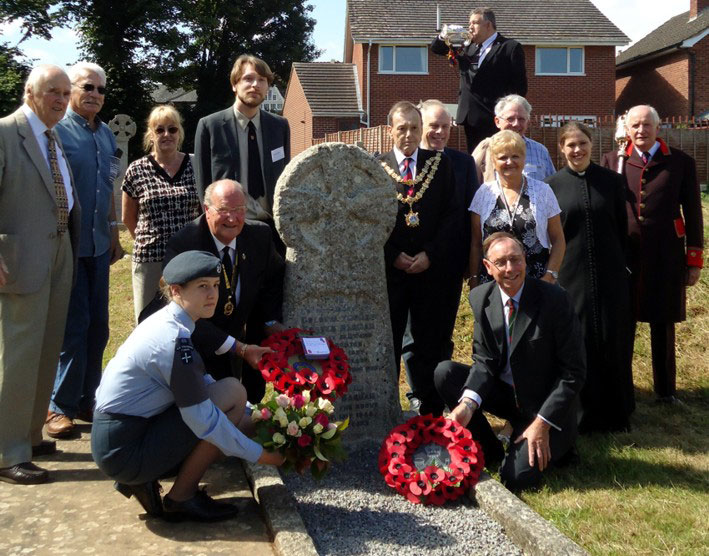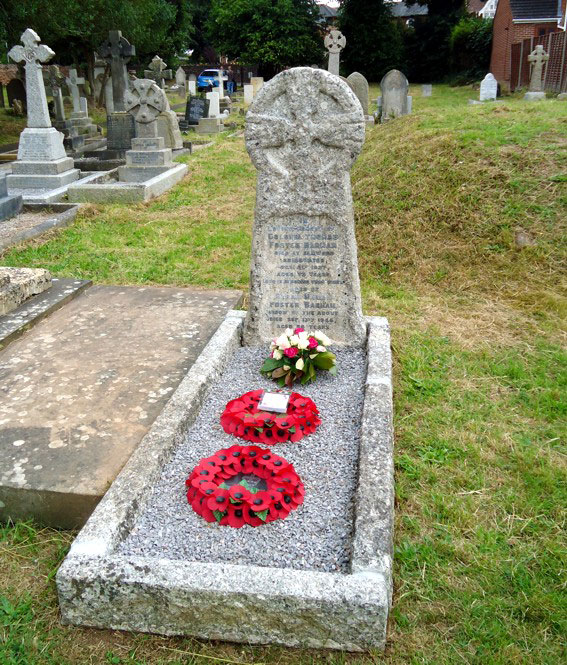On 22 July 2016 the Friends of the Wembdon Road Cemetery held a service of rededication to remember Colonel Thomas Foster Barham, having recently repaired his long neglected and broken memorial.
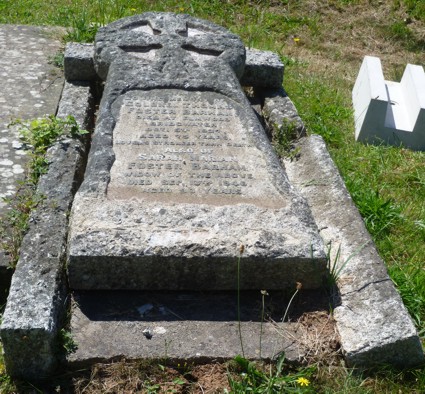

The Chairman, Dr Miles Kerr-Peterson welcomed everyone and gave a short speech:
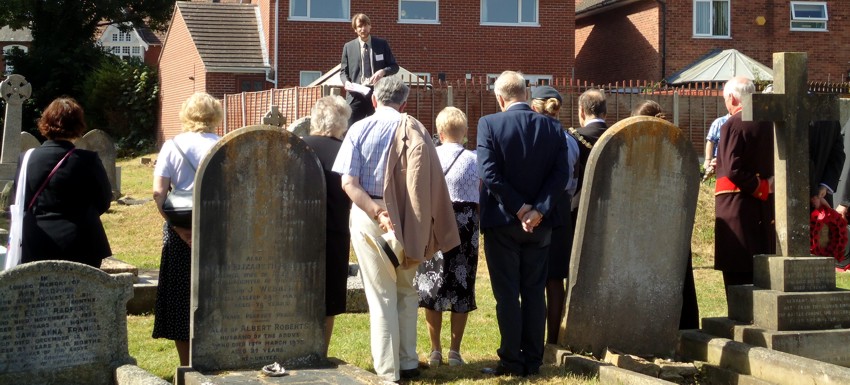
On behalf of the Friends of the Wembdon Road Cemetery, good morning everyone, I'm delighted you could all make it today. We have a wide range of representatives here today, Wembdon village, Bridgwater town, Sedgemoor District councils, our Mayor Cllr Alex Glassford, our ward councillor Gill Slocombe and our MP, Ian Liddell Grainger. We have representatives from the Somerset British Legion, the Rifles, Military Museum Trust, Blake Museum and the Civic Society. Welcome all.
We're here to rededicate this memorial, which has been perfectly repaired by Fine Memorials, memorial masons of Bridgwater, on behalf of the Friends, and the area around tidied up by our dedicated volunteers in the past couple of weeks. We're here to remember Colonel Thomas Foster Barham. This is principally to remember his efforts during the First World War to form the Bridgwater Volunteer Training Corps - essentially the town's Home Guard or Dad's Army - its last line of defence, during that war. This was for men too young, old or unable to join the regular army. I'll come back to this in a moment, as Barham's life before this is quite remarkable in itself.
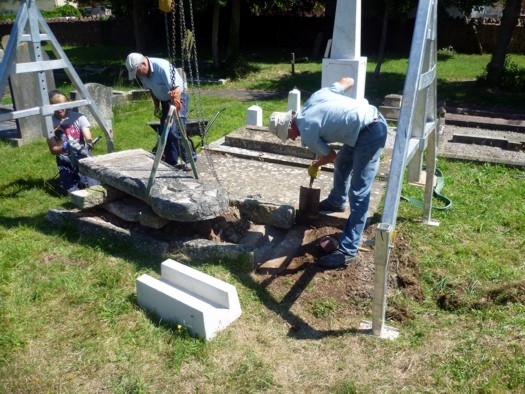
Thomas Foster Barham was born in Bristol on 21 February 1852. He was the son of solicitor, a Cornishman, Eustace Foster Barham and Ellen Hore. He was named after his grandfather, a famous musician and writer. Thomas' Cornish roots are remembered in this cross, a distinctive Cornish cross, a type of Celtic cross and this the only one in the cemetery. By 1861 Thomas' parents had left Cornwall and had moved over there to Wembdon Hill, Eustace having gone into legal partnership to form Barham and Carslake of Castle Street in Bridgwater. That year Thomas had been sent away to boarding school, one of ten pupils of the school at 3 Albert Villas, in Clifton, Bristol. He then attended Winchester School and took up the legal profession like his father.
By 1871, Thomas was living in Wembdon, and had found employment as a clerk. It was this time, aged 19 or 20 or thereabouts that he joined the Bridgwater Company of the 2nd Admin Battalion of the Somerset Royal Volunteer Corps, starting his long association with the volunteer military forces. He also found time to have an adventure abroad: as on 17 July 1879 Thomas married Sarah Marian Prince in St Petersburg, Russia, of all places. Sarah, who is also buried here was born in Scarborough, the daughter to the American Ambassador to Russia, who was four years Thomas' junior. How they met and how he ended up in Russia is a bit of a mystery at the moment.
By 1881 Thomas and Sarah had set up home in Halesleigh House, now the Quantock Restaurant over there with the bell tower. He was working as a solicitor in his father's firm and was now Captain in the Volunteers. The 2nd Admin Battalion became the 2nd Volunteer Battalion of the Somerset Light Infantry in 1882. This was when he became the commanding officer of 'I' company, also referred to as the Bridgwater Rifle Corps. In 1889 'I' company, consisted of 146 men.
When you look through all the photographs of civic events in Victorian and Edwardian Bridgwater, Thomas was always present. When the new town bridge was opened on 5 November 1883, Barham presented the Mayoress with the silver key to unlocked the chained padlock, which is now in the museum. For all the major civic events over the next fifty years Barham and his rifles stood on the Cornhill and fired a volley at each celebration.
By 1891 Thomas and Sarah had moved to Wembdon Hill. About this time he was awarded the Volunteer Decoration for twenty years' service. It is likely that he retired from the Volunteer Force in 1908 on the conversion of that body to the Territorial Force, the TA as it is now. He was extremely popular with all his men. His obituary records his commanding appearance, making him an imposing figure on parade. He also enjoyed gentler pursuits. He was intensely fond of music and was ever ready to give his services as a vocalist to assist any deserving cause. He possessed a tenor voice of much quality, and was for some years a member of the Wembdon church choir and later the president of the Bridgwater Choral Society. By 1911 Thomas and Sarah had moved to Elmwood House in Hamp, now the location of Blake School. I'm delighted the Reverend Hannah Alderson of Holy Trinity Parish is here today in connection with their residence at the big house.
He took over his father's legal firm on his death and in later years he partnered with Douglas Watson, forming Barham and Watson. From 1893 he was Coroner for West Somerset for some thirty years, conducting over a thousand inquests. He served as Town Clerk of Bridgwater from 1910 to 1921. He was clerk to the Conservators of the Avon, Brue, and Parrett Fishery Board. He was also up to the time of his death a director of the Bridgwater Gas Light Company. He was twice president of the Bridgwater Hospital association. So he was both soldier, politician, businessman, philanthropist and singer.
In 1914 it looked as though Barham would enjoy a quite if useful retirement. However, Barham would have a second military career, despite his aging years. When the First World War broke out in 1914, local defence forces were raised all over the county under private initiatives by former servicemen. Strictly speaking this was illegal, but these were tolerated as they were intended to be an auxiliary force in case of German invasion. Barham quickly raised a force in Bridgwater, for those men in the community too young, too old, or unable to enlist in the regular army. These were all men, Barham included, who wanted to do their bit. They met in Barham's gardens in Hamp, in the Butter market or in the rink. The town held a generous collection to provide uniforms and arms for the men.
Many of the small independent organisations were consolidated in November 1914 as the Volunteer Training Corps, although Barham kept his independent for a while. The Government of the day was reluctant to give the VTC full official recognition and as a result they were barred from wearing official army uniform, wearing instead a distinctive Lovat green uniform. All personnel wore a red arm band, bearing 'GR' in black. The GR, Georgious Rex (King George) had various jokes associated with it, including 'Grandpa's Regiment', or 'Genuine Relics'. In only the last couple of days our Honorary advisor, Harry Frost, who has come all the way from Worcester for today, found out that his great grandfather served under Foster Barham. Apparently the Bridgwater name for these men was the 'silkworms'. We're not sure on the significance of this yet, but is possibly a reference to gray hair.
Barham's forces formed the first battalion of the Somerset Volunteer Regiment. On the first of September 1916 Barham became the 'County Commandant' of all of Somerset, whilst still being the CO of the Bridgwater Battalion. On the first of November that year the Bridgwater Battalion contained 19 officers and 1,210 other ranks. The headquarters were in 60 Clare Street, with outlying platoons based at Highbridge, Burnham-on-Sea, and Wedmore. On 17 August 1917 Barham handed over command of the 1st Battalion, remaining County Commandant.
In 1917 the corps was allowed to use normal army Service Dress uniforms, with a Royal Arms cap badge. There was quite a stir in the town when they first came out on parade, looking every part as modern soldiers, albeit with a few more white heads and bushy beards. In 1918 the Somerset Volunteer Regiment was converted into the 1st Volunteer Battalion of the Somerset Light Infantry. In 1920 after the war, the VTC was disbanded. In reward for his services Barham was granted an OBE in July 1919 and presented to the King and Queen at Bath in 1924.
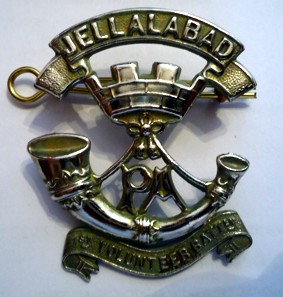
What makes this all the more remarkable is that during the war Douglas Watson had been called up and Thomas continued to run the solicitors firm single headedly as well!
In 1915 he gave an interview to the Bridgwater Mercury, which neatly illustrates his motivation. 'There are a large number of able bodied men in this town past the age for enlistment who have hitherto never done a hand's turn for the defence of their country or their hearths and homes, who should be eager to seize the opportunity the corps affords of acquiring some knowledge, small though it may be, of rifle shooting and military work. How they can square it with their consciences to do absolutely nothing is beyond me'. Regardless of the rights and wrongs of that wae, we can all see how Foster Barham was determined to do his duty.
At the end of the war. he took the greatest interest in the welfare of ex-servicemen, and was a for a time the president of the Bridgwater Branch of the Royal British Legion and here today we have Robert McDonald, chairman of the Somerset branch of the Legion in association with his work.
I think it is important to remember Thomas Foster Barham when we think of the First World War. Certainly, men like Walter Roman over there gave their lives, the ultimate sacrifice from home and hearth a hundred years ago this month at the Somme and this deserves remembering and honouring. Yet this was a Total War. Every member of society was part of the war, every individual in Europe was involved in some way. Foster-Barham is worth remembering because, despite being retired and an old chap at this point, he stepped forward to serve: he helped-out, he served his country, his community and his home in the best way he could, using the skills he had acquired over a lifetime. If nothing else we have also seen a very admirable public spirit, which we can all here associate with.
Thomas died on 5 October 1927. Thomas and Sarah had no children and she would die in 1946 at the age of 90, at the time living in Broughton Lodge on the Wembdon Road.
Details of Barham's military service has been very kindly provided by a trustee of the Rifles, the Somerset Military Museum, Taunton. Lieutenant Colonel David Eliot MBE DL, chairman of that Trust, then made a short speech outlining the association of the volunteers and the Light Infantry to the modern day Rifles based in Taunton.
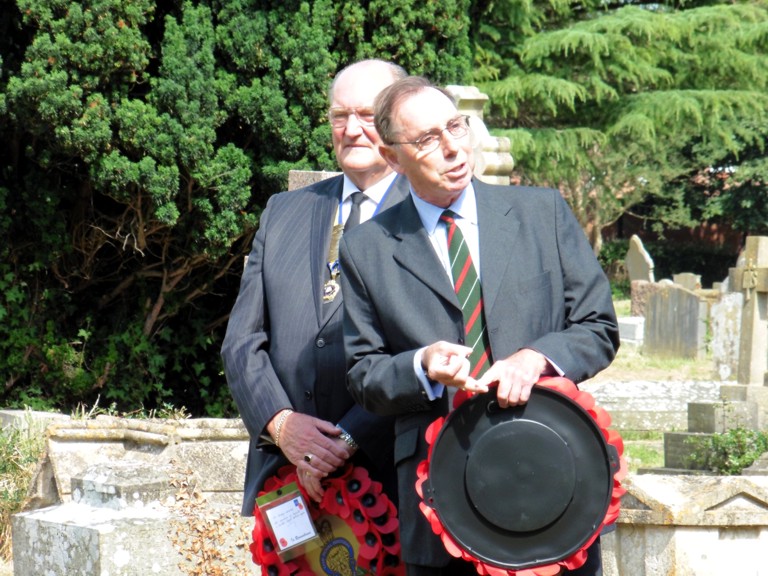
Bridgwater's MP, Ian Liddell-Grainger, sometime a volunteer in the Territorial Army, gave a short address thanking the Friends for their efforts in remembering Foster Barham and in their efforts to revive the cemetery.
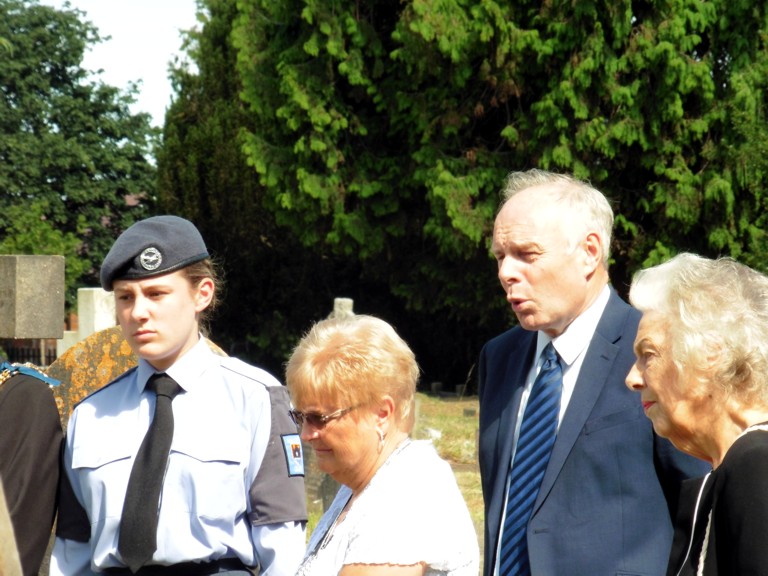
A bouquet was laid on the memorial on behalf of the Town of Bridgwater by the Mayor's Cadet Aiesha Dabenett.
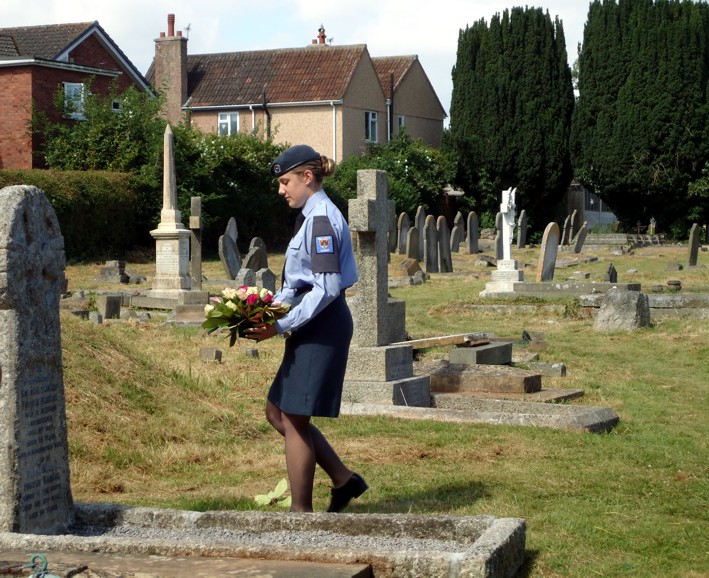
Robert McDonald, chairman of the Somerset branch of the Legion, then laid a wreath on behalf of the Legion.
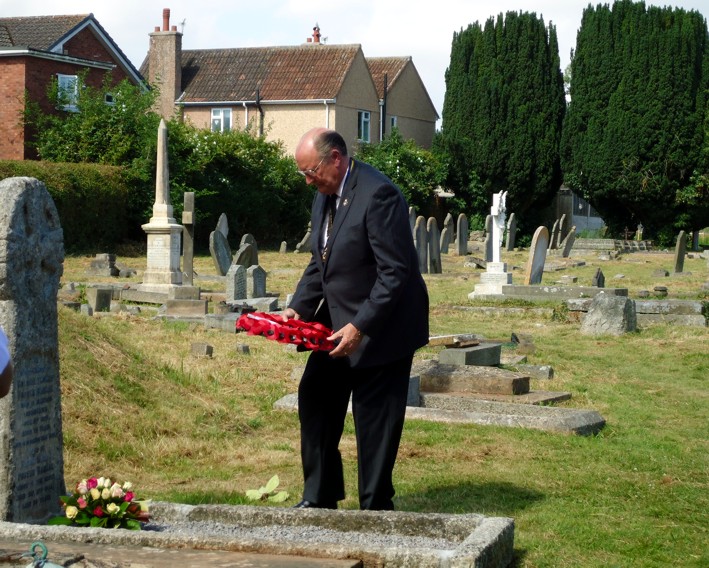
Lieutenant Colonel David Eliot then laid a wreath on behalf of the Rifles.
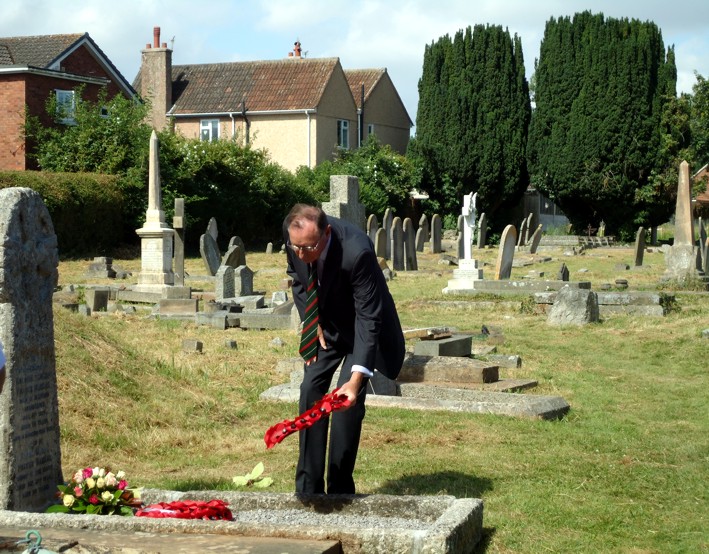
The Reverend Hannah Alderson of Holy Trinity Parish then gave a prayer and a blessing to rededicate the memorial.
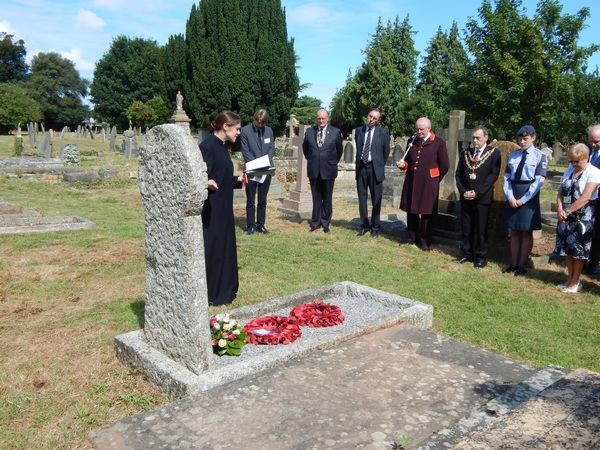
Prayer
Father God, as we gather in this place
We thank you for the Wembdon Road cemetery
And for those who keep it and care for it
We pray for all those for whom this is a special place
Grant that many may find a sense of peace here.
On this occasion of the rededication of the memorial to Thomas Foster Barham
We thank you for the brave service of the Bridgwater Volunteer training corps
And especially for the life of this gentleman
For his personal qualities of loyalty, dedication, courage and service to his community.
Give us grace to follow in his footsteps
That we may at last enter
Into your eternal joy
Through Jesus Christ our Lord.
Amen.
Blessing for the Grave
Lord Jesus Christ, by your own three days in the tomb, you made the grave a sign of hope that promises resurrection even as it claims our mortal bodies. Grant that Thomas and Sarah may sleep here in peace until you awaken them to glory, for you are the resurrection and the life. Then they will see you face to face and in your light will see light and know the splendour of God, for you live and reign for ever and ever. Amen.
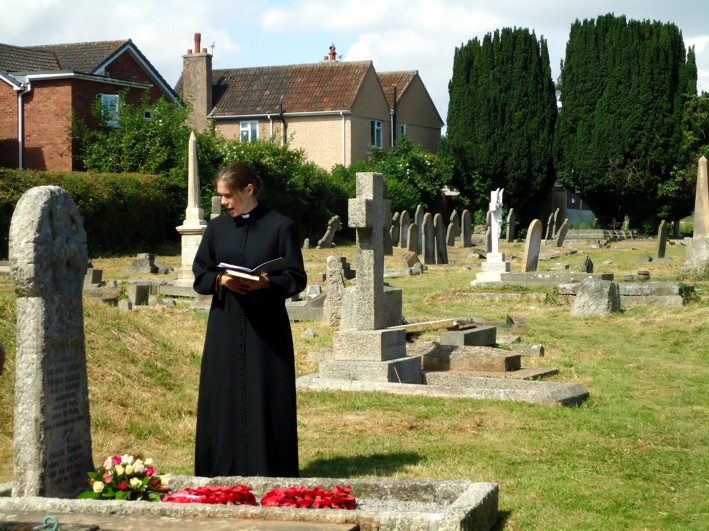
Bugle player Neill Baker then called the Last Post and a moment of silence was observed.
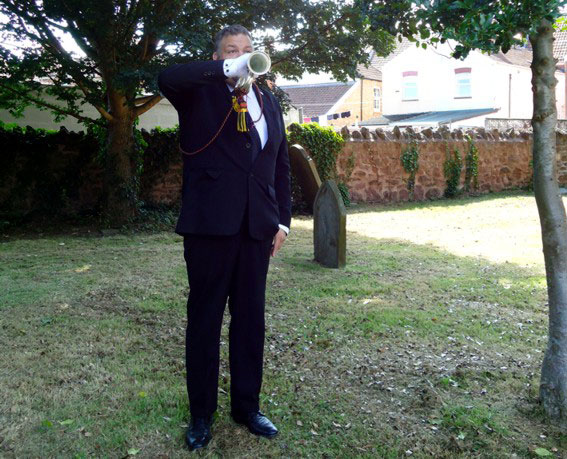
After photographs for the press, refreshments were taken in the Maltshovel.
